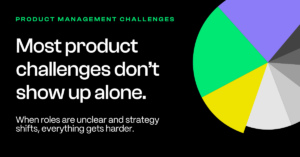
How IATA Created a Shared Product Language to Power Its Next Era of Innovation
Want a PDF version of this case study? Download Here Company Snapshot The International

For our next installment of our Women in Product Management Series, I interviewed Aruna Thapa, Senior Director of Product Strategy at IQVIA Technologies.
Nicole: Thank you for joining me, Aruna. Our goal with this series is to shine a light on Product Management as an option for women from various backgrounds and experiences. I’m excited to highlight a leader such as yourself.
Aruna: Thank you for inviting me.
A great place to start is what led you to Product Management?
I launched my career as an electrical engineering intern at a startup, captivated by the creative aspects of innovation. Shifting into a role focused on idea development, I forged a close connection with the CEO, expressing a desire to enhance our offerings. Despite initial doubts about our product’s market fit, research uncovered core capabilities, enabling me to position it effectively.
Post-college, I pinpointed a substantial revenue loss at a law firm tied to data quality issues. The founder enlisted my assistance, and I assembled a team, executed the project, and saved the company $750,000 per month. This hands-on experience honed my intuition for fundamental Product Management philosophy, earning me the formal title of Product Manager in 2008.
Now with over 20 years of experience, I’ve internalized the lesson to never underestimate the significance of a framework and the iteration process by consistently applying it in various aspects of my work.
What are some lessons you learned during your Product Management journey?
In my first Product Manager role, I tackled the challenge of creating a training simulation for Microsoft Excel, involving the development of 1200 simulations. Underestimating the complexity, I failed to break down the process with proper building and iteration, overconfident in immediate success. It became apparent, after 600 simulations, that the company lacked “the know how”. We should have identified the absence of a Product Management framework on the 50th simulation. Crucial check-ins with iterations were overlooked. This was a lesson learned in hindsight, and unfortunately the initiative failed!
This experience emphasized the importance of a solid framework, highlighting that intuition and knowledge alone are insufficient. The product’s failure resulted from the absence of building, validation, and iteration—three critical elements. Now with over 20 years of experience, I’ve internalized the lesson to never underestimate the significance of a framework and the iteration process by consistently applying it in various aspects of my work.
This collaborative process, involving cross functional stakeholders to address complex problems, is what I find truly fulfilling about Product Management. It’s all about winning together!
That’s really vulnerable—you have all this experience and knowledge, and you’re still always learning. That’s a good thing!
The key is to acknowledge three buckets 1) Known Knowns 2) Known Unknowns and 3) Unknown Unknowns. The known knowns are the things that we know that we know. The known unknowns are the things that we now know we don’t know. But there are also unknown unknowns. These are aspects that you’re not even aware of until they unexpectedly surface. These unforeseen elements can arise at any time, requiring your careful attention. Despite having a wealth of experience and knowledge, I recognize the value of always being open to new insights. It’s a positive aspect of professional growth.
I love that. With all that you’ve learned through this journey, what do you like most about Product Management?
I appreciate that Product Management operates without political dynamics. The product’s reception by customers is a clear indicator—either they love it, or they don’t. The ultimate testament lies in the users’ experience. I value the blend of science and art in Product Management, where professionals discern insights that others may miss. Product professionals conceptualize, validate, and deliver solutions to the market with genuine satisfaction and pride. However, we must acknowledge that we can’t achieve this in isolation. Collaboration to align vision and collectively bring solutions to market is essential for Product Managers who work with diverse individuals in the organization.
This collaborative process, involving cross functional stakeholders to address complex problems, is what I find truly fulfilling about Product Management. It’s all about winning together!
I imagine there are innate challenges in working with many different people. What do you find most challenging about Product Management, especially around working toward that shared vision?
A Product Manager has a certain mindset. Identifying market gaps, which is distinguishing between “pain killers and vitamins”, is a skill set we naturally develop with experience. However, the real challenge lies in uniting diverse stakeholders. Many Product Management professionals struggle with this aspect. Despite originating an idea, it’s essential to make it a collective vision to garner motivation and commitment. Early in my career, I grappled with this. Empathy was a skill I had to hone, especially when aligning cross functional stakeholders, whether they are Marketing, Sales, or Executives who are funding the initiative.
Mastering this perspective, seeing challenges through the lens of communication and alignment, proved crucial. As a young Product Management professional, I faced friction, misinterpreting resistance as territorial behavior. However, I learned that humility and empathy were indispensable. Product Managers, in essence, engage in a form of evangelism, fostering collaboration in various settings. As the perceived “CEO of the product”, the win is not about personal achievement but the success of the product. It may have originated as my idea, but success is achieved when it becomes a shared vision. Pride has no place in the Product Management profession, as we collectively strive to solve market problems rather than individual challenges.
As a young Product Management professional, I faced friction, misinterpreting resistance as territorial behavior. However, I learned that humility and empathy were indispensable.
It’s about the team. Tell me about hiring for your team. What do you like to see when you’re hiring?
Reflecting on my younger self at 21, I ponder the risk I took by insisting on research with my first CEO. It was a bold move that could have cost me my job, but it marked the beginning of my journey into Product Management. When hiring, I place myself in those shoes, using a seemingly random question like the Netflix scenario or Uber scenario to gauge a candidate’s mindset. How they approach such challenges speaks volumes about their thought process. To delve deeper, I have candidates create and present case studies in front of 15 people. It uncovers their hands-on experience in a real-life setting.
Most hires become integral members of my team where I have a Community of Practice Series, a team of 60+ individuals dedicated to fostering a creative mindset. The team meets weekly to share ideas, discuss successful research processes, and engage in continuous learning. This collaborative environment serves as a school of practice, allowing the team to witness and learn from each other’s examples.
While some team members may eventually leave for various reasons, I take pride in their growth and success, even if they seek opportunities elsewhere. The Community of Practice is about selflessly providing every skill set, knowing that individuals may choose different paths. It’s a commitment to building both the team and the mindset, understanding that nurturing talent is a worthwhile endeavor.
Is there advice you have particularly for women considering a move into Product Management?
In the early stages of my career, female leadership examples were scarce. I found myself struggling with self-doubt and imposter syndrome. I often dismissed my intuition as being overly emotional. It was challenging to overcome thoughts of unworthiness and fear of risk which acted as persistent saboteurs hindering my progress. However, amidst these saboteurs, I learned to listen to my sage, reminding myself of my intelligence and strength.
It’s not just about affirmations; it’s about applying that confidence. Allowing oneself to take risks, accept failures, and learn from them is crucial. I observed that men often embrace this mindset, while women might lean towards the path of least resistance. I advocate for cultivating the confidence to acknowledge that failure is okay, and change is a part of growth. It’s about silencing the saboteurs and embracing a positive narrative.
I found myself struggling with self-doubt and imposter syndrome. I often dismissed my intuition as being overly emotional.
I think women, more so than men, really struggle with negative self-talk.
I sometimes still struggle with this. I used to grapple with this challenge, particularly when it came to public speaking. The fear of freezing in front of a large audience used to dominate my thoughts – a classic saboteur moment. The internal dialogue echoed, “I’m going to be in front of 200 people, and I’m going to freeze. I won’t be able to say anything.” However, I intervened allowing my sage to create a self-assuring reminder that I had never experienced such a freeze before. My intervention assured me that I was well-prepared, I knew the material inside out, and I had synthesized it extensively. While the saboteur continued to cast doubts on my confidence, my sage offered a different perspective. I allow the sage to guide me, enabling me to take both quantitative and qualitative risks.
A very important takeaway is even in failure, we need to recognize the importance of not being overly harsh on ourselves. Instead, embrace the opportunity for personal growth and maturation, as we often neglect this aspect of our development journey.
Even in failure, we need to recognize the importance of not being overly harsh on ourselves. Instead, embrace the opportunity for personal growth and maturation, as we often neglect this aspect of our development journey.
That is beautiful advice for women—ignore the saboteur and listen to the sage. Thank you so much, Aruna, for sharing your unique experiences and background.
This was fantastic, such an organic conversation. Thank you for having me.
To read the entire series on Women in Product Management make sure to sign up for our newsletter.


Want a PDF version of this case study? Download Here Company Snapshot The International

Most product teams don’t fail because they can’t ship. They fail because product discovery didn’t do its job. As product managers and product leaders, we’ve all lived this

Product management feels harder than it should It’s not because teams are lazy. Not because PMs